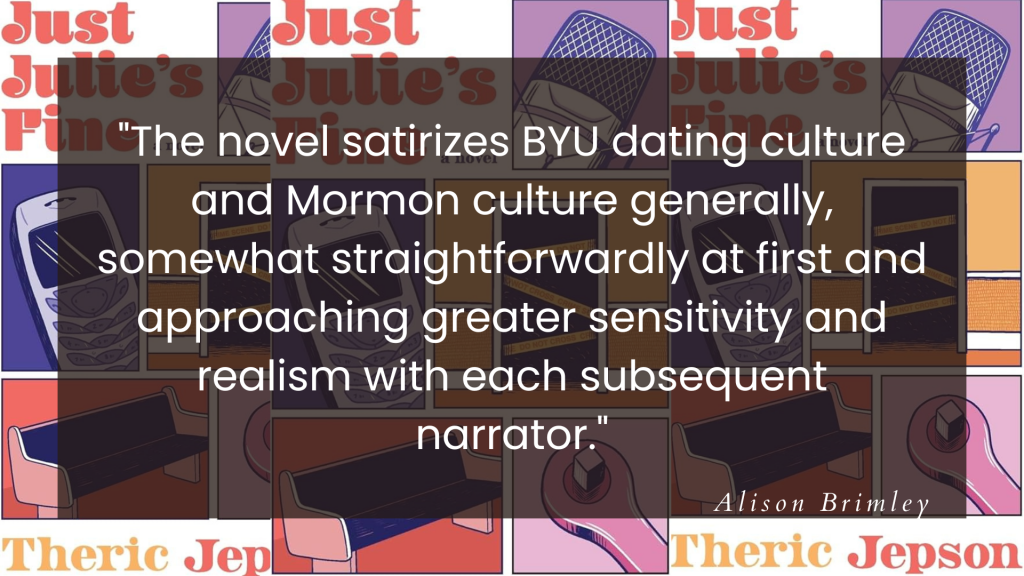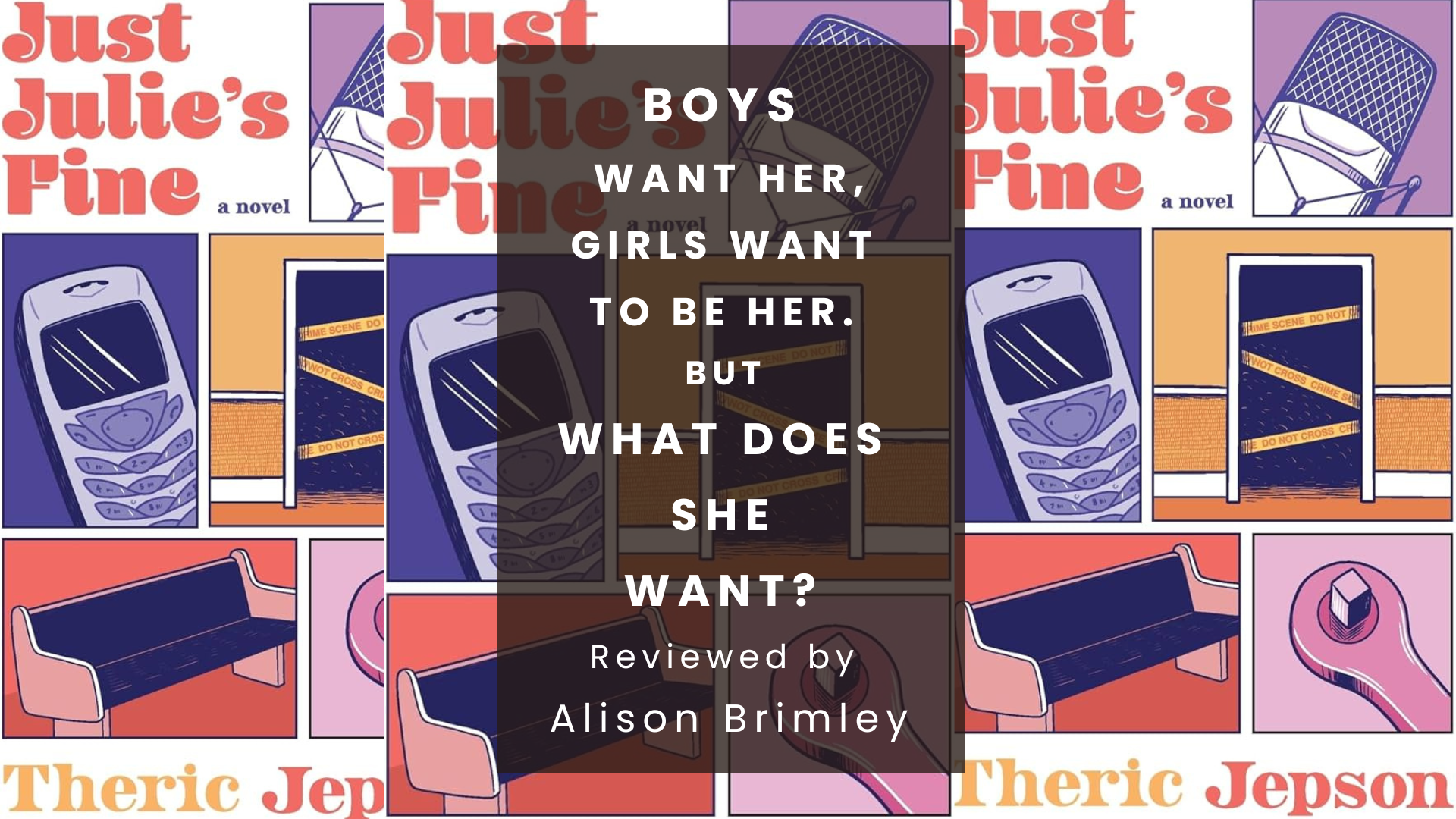Articles/Essays – Volume 57, No. 3
Boys Want Her, Girls Want to Be Her. But What Does She Want? | Theric Jepson, Just Julie’s Fine
Julie Them, the focal character of Theric Jepson’s new novel Just Julie’s Fine, is a Mary Sue character: “so perfect every reader hates her” while “in the fictional world all people, heroes and villains alike, adore her utterly” (1). The narrator isn’t shy about proclaiming this from the get-go. Julie is a BYU student in 2005, a Marriage & Family Development major whose most pronounced perfection is her stunning beauty, which not a single person in her vicinity can help but notice. She also possesses a strange quality of inviting people’s confidences, leading to astonishingly personal conversations with people she hardly knows (not one but two characters find themselves revealing a secret inability to fit the BYU mold in some essential, shameful way, and one even imagines Julie “as God the mother” (65) for her ability to comfort and understand). She’s preternaturally smart, and though she’s chosen a “throwaway major,” she is conversant in Emily Dickinson and Walt Whitman and has a freakish knack for physics. Perhaps most surprisingly, though, she commands the attention of every heterosexual male in a fifty-foot radius, and even women seem powerless to dislike her.
“I do not know how you will stand her,” the narrator warns (5).
To put it succinctly, Just Julie’s Fine is the story of a young woman who has been pigeonholed by her sex and incredible attractiveness into a life centered on finding a suitable marriage partner and, by extension, preparing for a life of mothering and homemaking. (The implicit tie of sex appeal to mother potential is hard to ignore here.) Or rather, because of Julie’s attractiveness, her task is less to find a partner and more to sort through (and fend off) dozens of would-be partners who aren’t right for her, from a stranger in Coke-bottle glasses shooting his shot in the Costco parking lot to an arrogant wannabe Mormon rockstar (“For a sec, I was worried you might be a good kisser,” (42) Julie quips when he plants one on her outside her apartment.) She’s a BYU student in this story set nearly two round decades ago—a span of time that, to this reader, feels somehow longer than it was. Already it feels like a story like Julie’s could not take place today, among twenty-year-olds raised on the internet—talk of patriarchy, the Bechdel test, and queerness are present in the novel but met with general ignorance by most of the characters.
Just Julie’s Fine is a (loose) sequel to Jepson’s 2019 novel Byuck, in which a pair of male students set out to write a rock opera about their quest to avoid marriage while at BYU. Byuck’s main character David Them is Julie’s older brother, though David does not appear in this novel. Themes at play in the earlier novel, though, are clearly treated from a different angle in Jepson’s newest offering.

In the end, Julie decides that the path she is on—evenings of multiple dates and days of child development homework—was never a choice made consciously. (A happy thing for her that she realizes this before committing to it in the form of temple marriage.) At the risk of inducing light spoilage, I’ll just say that Julie chooses to dedicate her energies to a field more challenging, more prestigious, and, incidentally, more male-coded. In some sense this seems inevitable: it would be hard to write about a woman in the modern age who doesn’t make such an adjustment without conjuring a vibe of tradwife propaganda. And yet the story doesn’t read—at least for a long time—like a go-girl empowerment tale. Julie is not plodding her way up Freytag’s pyramid to feminist enlightenment. Her story takes such a roundabout way of getting there.
For one, Julie’s own perspective isn’t truly accessed until the final chapter of the book. Until then, we see her only through the eyes of other characters, some as close to her as her roommates and some as distant as the bass player at a club Julie visits, giving us a progressively clearer view of Julie. Some of them envy her, some idolize her, some never learn her name. (In fact, many of them display a strange inability to remember her name, even when they do learn it.) Their encounters with her are recounted in a variety of formats—a letter home to a parent, a confessional stream-of-consciousness prayer addressed to a female God, even a podcast transcript resurfaced and annotated twenty years after the fact. Some of these characters introduce themselves and very nearly steal the show before disappearing, never to be seen again. The effect is of a polyvocal chorus, suggesting that an entire world is contained on the campus of BYU in 2005. These characters have a range of relationships to their faith, while Julie’s own beliefs are largely traditional, if unexamined (as per Tom Petty’s definition of a good girl, the narrator tells us in a footnote, Julie “loves Jesus (though she rarely thinks of him)” (5).
The novel satirizes BYU dating culture and Mormon culture generally, somewhat straightforwardly at first (our first POV characters are doltish roommates Maddysyn and Ashleigha, who draft an email to the Honor Code office to report a fellow student for mentioning sex, yet live for male attention and admire Julie because “she’s the one we learned looking-over-the-shoulder-to-put-the-boobs-in-profile from”) (10) and approaching greater sensitivity and realism with each subsequent narrator. By the end of the novel, we have reached Julie herself, and the qualities that defined her as a Mary Sue at the beginning of the novel are now treated as real problems to be solved. What does a young woman with an oversupply of beauty, kindness, and intelligence do with such abundance in the limited world she finds herself in? Perhaps the great surprise is that there is no great surprise—it would not be quite true to say that some great mystery at Julie’s heart has been concealed beneath a distractingly beautiful facade, only to be revealed once we enter her head. Whatever the reader discovers about her, Julie discovers almost at the same time. Her journey to self-knowledge is precipitated by an encounter with the rarest of men: one who isn’t interested in her. But her most important relationships are finally revealed to be those she has with other female students: two iconoclastic roommates and a group of “lady engineers” (109) bonded by the scarcity of their species. The world of Jepson’s BYU is a joy to inhabit, and his novel is a tangent-following gambol that takes us from ward prayer (a pileup of people in an apartment living room that’s called “a regular Mormon orgy” (143)) to a college robot-building competition to the Center Street of Provo’s early-aughts indie rock scene. But an unsettling current lurks beneath the surface, allowing us to see through the eyes of characters on the margins even while circling around an apparent paragon of Mormon womanhood.
Theric Jepson. Just Julie’s Fine. By Common Consent Press, 2023. 170 pp. Paper: $9.95. ISBN: 978-1948218962.


 Back to full Issue
Back to full Issue

